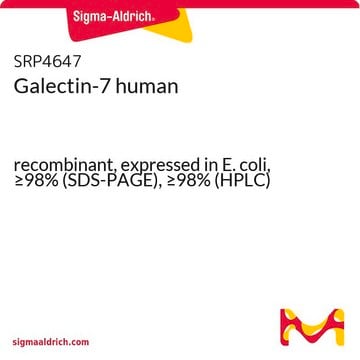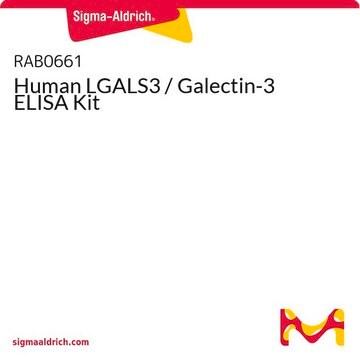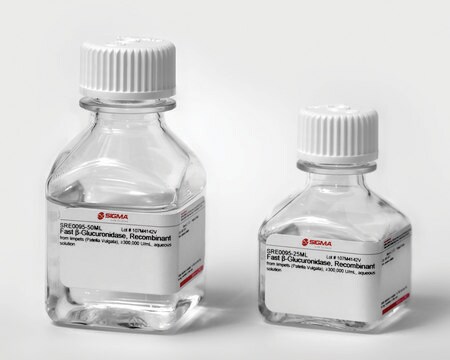G5170
Galectin-3 human
recombinant, expressed in E. coli, lyophilized powder
Sinónimos:
CBP 35, Carbohydrate-binding protein 35, Gal-3, Galactose-specific lectin 3, Galactoside-binding protein
About This Item
Productos recomendados
recombinant
expressed in E. coli
Quality Level
form
lyophilized powder
UniProt accession no.
storage temp.
−20°C
Gene Information
human ... LGALS3(3958)
General description
Application
- to test its interaction with N-acetyl lactosamine coated onto quantum dots
- to optimize Gal3-induced hemagglutination measurements in non-agglutinated or agglutinated chicken red blood cells (RBCs)
- in Gal-3 binding assay of serum samples from multiple sclerosis patients
Biochem/physiol Actions
Other Notes
Physical form
Storage Class
11 - Combustible Solids
wgk_germany
WGK 2
flash_point_f
Not applicable
flash_point_c
Not applicable
ppe
Eyeshields, Gloves, type N95 (US)
Certificados de análisis (COA)
Busque Certificados de análisis (COA) introduciendo el número de lote del producto. Los números de lote se encuentran en la etiqueta del producto después de las palabras «Lot» o «Batch»
¿Ya tiene este producto?
Encuentre la documentación para los productos que ha comprado recientemente en la Biblioteca de documentos.
Artículos
Find the right lectin for your research with our lectin selection guide, organized by lectin source/species, carbohydrate specificity, blood group specificity, and more.
Find the right lectin for your research with our lectin selection guide, organized by lectin source/species, carbohydrate specificity, blood group specificity, and more.
Find the right lectin for your research with our lectin selection guide, organized by lectin source/species, carbohydrate specificity, blood group specificity, and more.
Find the right lectin for your research with our lectin selection guide, organized by lectin source/species, carbohydrate specificity, blood group specificity, and more.
Nuestro equipo de científicos tiene experiencia en todas las áreas de investigación: Ciencias de la vida, Ciencia de los materiales, Síntesis química, Cromatografía, Analítica y muchas otras.
Póngase en contacto con el Servicio técnico







